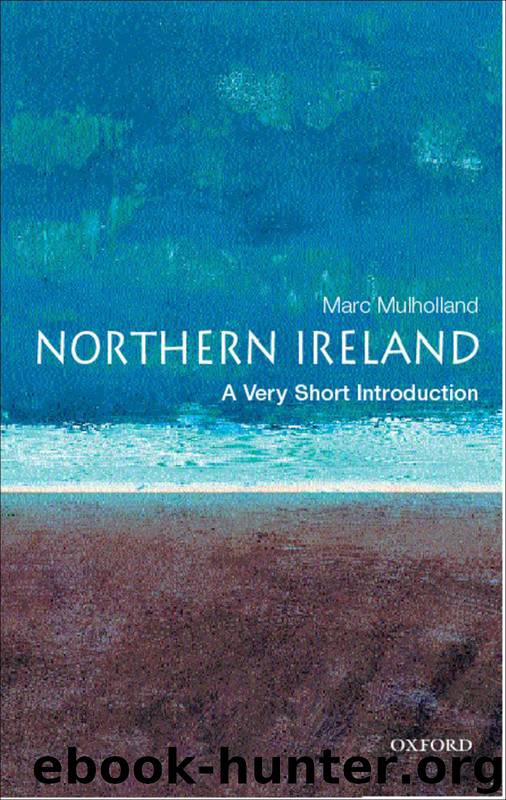Northern Ireland by Mulholland Marc

Author:Mulholland, Marc [Mulholland, Marc]
Language: eng
Format: mobi, epub
Publisher: Oxford University Press
Published: 2002-03-05T00:00:00+00:00
8. A Provo ‘Loose talk costs lives’ poster. In the 1970s, by consciously aping conventional wartime public information posters, the IRA hoped to bolster their military credentials.
On 27 January [1972] came the most prolonged incident of all, involving Meehann and seven other Volunteers and a detachment of the Scots Dragoon Guards. There was a four-hour gun-battle over the border near Forkhill, County Armagh, the British acknowledging afterwards that they had fired 4,500 rounds at the Provisionals’ position, although no one was hit on either side; the day’s one casualty was a farmer’s prize pig. Meehan strolled nonchalantly into Dundalk afterwards, and when a reporter asked him how he got on, said happily: ‘we pasted them.’
In the heavily militarized urban areas, a virtual war psychosis existed. Reporters found that the civilian population understood quite sophisticated military terminology. Shoot-outs were often dramatic, prolonged affairs, far from the grubby modus operandi of back-street assassination. A republican remembers such a firefight in Ballymurphy estate, Belfast, in July 1972:
We fired thousands of rounds at them. We tried to hit them from the house in Whiterock, from Corrigan Park, from Westrock and from Springhill. Bryson brought the Lewis gun up to the verandah of the flat above Mary’s Shop in Springhill Avenue. He stood up on two bins with the Lewis mounted on a piece of wood held by pigeon-holes in the brickwood, and raked Corry’s [a factory from which ‘enemy’ snipers were operating]; but they were still there.
Important was a widespread sense of martial pride. After August 1969 Irish Catholics could hardly identify with locally recruited Protestant security forces. British squaddies with Glasgow, scouse, or brummie accents were alien, and they were closely connected with deeply internalized mythologies of foreign oppression. ‘Cromwell’s men are here again’, as a popular republican song put it. The IRA, for many in the Catholic ghettos, provided validation for their sense of martial pride. To fight was good enough in the hothouse of early 1970s Northern Ireland. It was with this sentiment that one anti-internment song recalled the violence that greeted the introduction of internment in 1971:
On that black day in August, when Faulkner showed his hand,
He thought that by internment he could break our rebel band.
But the boys from Ballymurphy, how they showed the way that night
When they taught those English soldiers how Irish men can fight.
Download
This site does not store any files on its server. We only index and link to content provided by other sites. Please contact the content providers to delete copyright contents if any and email us, we'll remove relevant links or contents immediately.
Becoming by Michelle Obama(10016)
Beartown by Fredrik Backman(5731)
The Last Black Unicorn by Tiffany Haddish(5625)
Man's Search for Meaning by Viktor Frankl(4568)
The Book of Joy by Dalai Lama(3968)
The Five People You Meet in Heaven by Mitch Albom(3549)
In a Sunburned Country by Bill Bryson(3528)
The Choice by Edith Eva Eger(3467)
Full Circle by Michael Palin(3440)
The Mamba Mentality by Kobe Bryant(3259)
The Social Psychology of Inequality by Unknown(3013)
Imagine Me by Tahereh Mafi(2931)
Book of Life by Deborah Harkness(2921)
The Checklist Manifesto by Atul Gawande(2843)
Less by Andrew Sean Greer(2684)
A Burst of Light by Audre Lorde(2588)
The Big Twitch by Sean Dooley(2430)
No Room for Small Dreams by Shimon Peres(2357)
Everest the Cruel Way by Joe Tasker(2331)
